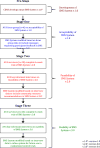Development of a text messaging system to improve receipt of survivorship care in adolescent and young adult survivors of childhood cancer
- PMID: 28364263
- PMCID: PMC5933434
- DOI: 10.1007/s11764-017-0609-0
Development of a text messaging system to improve receipt of survivorship care in adolescent and young adult survivors of childhood cancer
Abstract
Purpose: This study aimed to develop and examine the acceptability, feasibility, and usability of a text messaging, or Short Message Service (SMS), system for improving the receipt of survivorship care for adolescent and young adult (AYA) survivors of childhood cancer.
Methods: Researchers developed and refined the text messaging system based on qualitative data from AYA survivors in an iterative three-stage process. In stage 1, a focus group (n = 4) addressed acceptability; in stage 2, key informant interviews (n = 10) following a 6-week trial addressed feasibility; and in stage 3, key informant interviews (n = 23) following a 6-week trial addressed usability. Qualitative data were analyzed using a constant comparative analytic approach exploring in-depth themes.
Results: The final system includes programmed reminders to schedule and attend late effect screening appointments, tailored suggestions for community resources for cancer survivors, and messages prompting participant feedback regarding the appointments and resources. Participants found the text messaging system an acceptable form of communication, the screening reminders and feedback prompts feasible for improving the receipt of survivorship care, and the tailored suggestions for community resources usable for connecting survivors to relevant services. Participants suggested supplementing survivorship care visits and forming AYA survivor social networks as future implementations for the text messaging system.
Conclusions: The text messaging system may assist AYA survivors by coordinating late effect screening appointments, facilitating a partnership with the survivorship care team, and connecting survivors with relevant community resources.
Implications for cancer survivors: The text messaging system has the potential to improve the receipt of survivorship care.
Keywords: Adolescent and young adult; Late effects; Mobile device; SMS; Survivorship; Text message.
Conflict of interest statement
Figures



Similar articles
-
The use of mobile technology and peer navigation to promote adolescent and young adult (AYA) cancer survivorship care: results of a randomized controlled trial.J Cancer Surviv. 2019 Aug;13(4):580-592. doi: 10.1007/s11764-019-00777-7. Epub 2019 Jul 26. J Cancer Surviv. 2019. PMID: 31350681 Free PMC article. Clinical Trial.
-
Feasibility and acceptability of a pilot tailored text messaging intervention for adolescents and young adults completing cancer treatment.Psychooncology. 2020 Jan;29(1):164-172. doi: 10.1002/pon.5287. Epub 2019 Dec 8. Psychooncology. 2020. PMID: 31713265 Clinical Trial.
-
Development of a Self-management and Peer-Mentoring Intervention to Improve Transition Readiness Among Young Adult Survivors of Pediatric Cancer: Formative Qualitative Research Study.JMIR Form Res. 2022 Aug 3;6(8):e36323. doi: 10.2196/36323. JMIR Form Res. 2022. PMID: 35921137 Free PMC article.
-
Cognitive Impairment in Survivors of Adolescent and Early Young Adult Onset Non-CNS Cancers: Does Chemotherapy Play a Role?J Adolesc Young Adult Oncol. 2016 Sep;5(3):226-31. doi: 10.1089/jayao.2015.0025. Epub 2016 Apr 14. J Adolesc Young Adult Oncol. 2016. PMID: 27078009 Review.
-
Models of Cancer Survivorship Care for Adolescents and Young Adults.Semin Oncol Nurs. 2015 Aug;31(3):251-9. doi: 10.1016/j.soncn.2015.05.005. Epub 2015 May 7. Semin Oncol Nurs. 2015. PMID: 26210203 Free PMC article. Review.
Cited by
-
Proposal for the User-Centered Design Approach for Health Apps Based on Successful Experiences: Integrative Review.JMIR Mhealth Uhealth. 2020 Apr 22;8(4):e14376. doi: 10.2196/14376. JMIR Mhealth Uhealth. 2020. PMID: 32319965 Free PMC article. Review.
-
Healthy lifestyle interventions for childhood and adolescent cancer survivors: a systematic review and meta-analysis.Child Health Nurs Res. 2023 Apr;29(2):111-127. doi: 10.4094/chnr.2023.29.2.111. Epub 2023 Apr 30. Child Health Nurs Res. 2023. PMID: 37170490 Free PMC article.
-
Age-related acceptability of vaginal self-sampling in cervical cancer screening at two university hospitals: a pilot cross-sectional study.BMC Public Health. 2019 Jul 18;19(1):963. doi: 10.1186/s12889-019-7292-1. BMC Public Health. 2019. PMID: 31319838 Free PMC article.
-
Digital Health Interventions for Adolescent and Young Adult Cancer Survivors.JCO Clin Cancer Inform. 2018 Dec;2:1-15. doi: 10.1200/CCI.17.00138. JCO Clin Cancer Inform. 2018. PMID: 30652583 Free PMC article. Review.
-
Use of digital health tools for health promotion in cancer survivors.Psychooncology. 2021 Aug;30(8):1302-1310. doi: 10.1002/pon.5677. Epub 2021 Apr 1. Psychooncology. 2021. PMID: 33742737 Free PMC article.
References
-
- Howlander N, et al. SEER Cancer Statistics Review, 1975–2010. 2013 http://seer.cancer.gov/csr/1975_2010/ Accessed July 14, 2015.
-
- Oeffinger KC, Hudson MM. Long-term complications following childhood and adolescent cancer: foundations for providing risk-based health care for survivors. CA Cancer J Clin. 2004;54(4):208–36. - PubMed
-
- Zebrack BJ, Zeltzer LK, Whitton J, Mertens AC, Odom L, Berkow R, et al. Psychological outcomes in long-term survivors of childhood leukemia, Hodgkin’s disease, and non-Hodgkin’s lymphoma: a report from the Childhood Cancer Survivor Study. Pediatrics. 2002;110(1 Pt 1):42–52. - PubMed
MeSH terms
Grants and funding
LinkOut - more resources
Full Text Sources
Other Literature Sources

